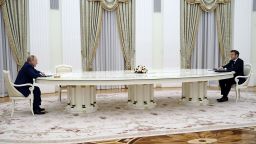Read most headlines coming out of the West around Ukraine, and the situation looks dire.
Russia’s invasion of Ukraine “could begin at any time”– US Secretary of State Antony Blinken. “American citizens should leave now” – President Joe Biden. “The number of (Russian) troops is going up, while the warning time is going down” – NATO Secretary General Jens Stoltenberg.
In Kyiv, many embassies are advising their citizens to pack their bags and leave as fresh shipments of military aid – including pallets of US-made Javelin anti-tank missiles – arrive on the tarmac in Ukraine.
But in Moscow, it’s still possible to get a late booking at the swish Café Pushkin, although it’s a bit harder to get a table at another prime people-watching venue, Dr. Zhivago, a stone’s throw from Red Square.
That’s not to suggest the Ukraine crisis is not front and center in Russia.
A flurry of high-level diplomatic visits has dominated the airwaves this week, beginning with French President Emmanuel Macron’s one-on-one meeting with Russian President Putin and concluding with a sit-down between Russian Minister of Defense Sergei Shoigu and UK Secretary of State for Defense Ben Wallace.
But in the glittering disco-ball that is Russia’s capital city, the geopolitical drama feels like an illusion. Despite the talk of an imminent Russian attack – and the indisputable evidence that Russia has ringed the Ukrainian border with more than 100,000 combat ready troops and sent new warships into the Black Sea – Russia hardly seems to be on a war footing, at least as far as the public discussion goes.
Take for instance, Russian state media’s coverage of UK Foreign Secretary Liz Truss meeting with Russian Foreign Minister Sergey Lavrov on Thursday. The tone was jovial, and sometimes outright trolling.
Russian observers focused on Truss’ sartorial choices (with state television channel Russia 24 noting her fur hat à la Russe) and her unfortunate gaffe over the location of Rostov and Voronezh oblasts (they are regions that are part of sovereign Russia, as Truss later made clear in an interview with the Russian outlet RBC).
And online, Russians also made light of an especially serious moment: The over five-hour-long meeting between Putin and Macron.
Macron’s Moscow trip represented the most serious potential diplomatic opening in a weeks-long crisis, but it was the 20-foot long table that separated the two leaders in the Kremlin (after the French leader declined the Kremlin’s request for a Russian Covid-19 test) that launched a thousand memes.
One of those memes featured Ramzan Kadyrov, the leader of the Chechen Republic, dancing on the massive table. It was a reminder that Putin still has domestic headaches to worry about, such as the regional leader apparently taking the law into his own hands – not just in his home territory, but beyond it.
In a conference call with reporters, Kremlin spokesperson Dmitry Peskov dismissed the idea that Kadyrov was out of control, but he declined to give a readout of a meeting between Putin and Kadyrov, and had to bat away a journalist’s question about whether the Kremlin feared Kadyrov.
“Why should Putin be afraid of the head of the Russian region?” Peskov said.
But the Kremlin does care about ratings, and Putin must certainly be mindful of the fact that a major war with Ukraine – with potential massive casualties, broadcast to the world – could conceivably be unpopular, unlike Russia’s 2014 Crimea annexation, which was swift, relatively bloodless and provided a major boost to the Russian President’s ratings.
Divining Putin’s intentions in Ukraine is an impossible task, and anyone who claims to know is a fool. But if conflict is averted, might public opinion be a factor?
Andrei Kolesnikov of the Carnegie Moscow Center suggested as much in a conversation with CNN’s Kim Brunhuber.
“A real war could be unpopular. Until now, military operations were quite popular and the approval rating of Putin was based on the support after military operations [that were] successful, short, triumphal, just like Crimea, which provoked a wave of patriotism.”
“But right now we are talking about a bloody war, which will not be short, which will not be without victims, just like it was when Putin took Crimea. And this is another story,” Kolesnikov said.
Whether that tragic story plays out, then, is anyone’s guess but Putin’s.






